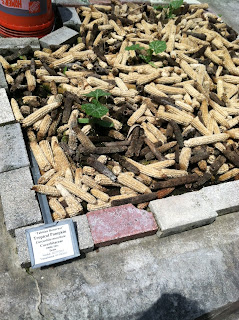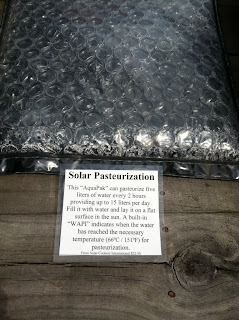Melanie-
This trip was really nice, I was to learn many new things. It also gave me the urge to have a garden myself. We were able to taste some nice fresh fruits! I tasted the strawberries and it was very delicious.
 |
Some of the cool things I learned during our trip were that macadamia nuts are the strongest nuts! In order to crush them they must be put in the oven in order to break them more easily. It also blooms all year around and is from Australia.
 |
| Macadamia Bush |
They had cool little hand washing stations all around the farm which were pretty neat to have. You put your foot on the pedal in order for the water to come out.
Cristina:
If you can't tell this pictures illustrates how people can grow plants on a hill as if it were a level field. We learned that you can easily assemble an A-frame out of three sticks, string, and a rock that measures whether something is level or not. Part of what makes ECHO so intriuging is that they take simple techniques and use them to get the job done.
During the last couple of weeks I have volunteered at the food forrest several times and each time I learn about how amazing the Moringa tree is and how helpful it can be. One example that is used frequently is how moringa can purify water for you and at ECHO they actually had an example. The left is water with Moringa and the right is the water for no treatment. To think all ou need to do is add powder to your water.
This is a table saw powered by a bike!
This is a water pump powered by an eliptical!
During our tour Vic (pictured above) talked about how we don't need electricity or fancy inventions to get water or to get things done, rather we can accomplish all of it with ease if we use what we all ready have. That is a powerful lesson. Instead of reinventing the wheel, use what you have!
Meredith:
Exploring ECHO on our past trip was a very eye-opening experience. Our class was able to see how much a garden can develop without a lot of work entailed at all.
Christian
I really liked the field trip to ECHO. I was worried that this trip would be boring, but besides being cold it was very enjoyable. We got to try some of the fruits they had harvested. One thing that amazed me was the section with all the tools and devices that are used every day in some places on earth. It is hard to believe that stuff that simple is used. But it is and it is very effective. Another part of the trip I liked was the duck pond. I didn't know it was possible to get ducks to stay in a pond. I also didn't know that they were good for the water and that you only need a 1 foot tall fence to keep them in. Later on in the tour we learned how labor intensive rice is to grow that surprised me. Another thing that I was surprised about was how hard bamboo was. I thought it was more like a plant that got though when it dried, so I was not expecting it to be that hard when it was still growing. So in the end I enjoyed, especially because of our tour guide Vic, who was very funny and knowledgeable.
Exploring ECHO on our past trip was a very eye-opening experience. Our class was able to see how much a garden can develop without a lot of work entailed at all.
Above is the "Tabitian Butternut, which is also referred to as Tropical Pumpkin. It was seeded on February 27 and transplanted on March 19. They are spread out across a carpet like material, so it does not require any maintaining like soil or sand would.
Solar Pasteurization that our tour guide Vic informed us about can pasteurize five liters of water every 2 hours. The "AquaPak" provides up to 15 liters of water per day and all you have to do is fill it up with water and lay it on a flat surface in the sun. Then, a built-in "WAPI" indicates when the water has reached the necessary temperature of 66 degree celsius/151 degrees fahrenheit for pasteurization.
Bamboo was also planted at ECHO and is a very sturdy, tall plant. It is a diverse group of fast-growing, woody grass-like plants. Bamboo provides materials for construction and many other uses to small scale farmers.
Exploring the various plants and foods that are available in the ECHO garden and nursery made me realize how easy it is to create a sustainable lifestyle. As Vic stated, "culture is very slow and difficult to change," but if people want to adopt a healthier way of living, then the transition will occur and be very productive.
Christian
I really liked the field trip to ECHO. I was worried that this trip would be boring, but besides being cold it was very enjoyable. We got to try some of the fruits they had harvested. One thing that amazed me was the section with all the tools and devices that are used every day in some places on earth. It is hard to believe that stuff that simple is used. But it is and it is very effective. Another part of the trip I liked was the duck pond. I didn't know it was possible to get ducks to stay in a pond. I also didn't know that they were good for the water and that you only need a 1 foot tall fence to keep them in. Later on in the tour we learned how labor intensive rice is to grow that surprised me. Another thing that I was surprised about was how hard bamboo was. I thought it was more like a plant that got though when it dried, so I was not expecting it to be that hard when it was still growing. So in the end I enjoyed, especially because of our tour guide Vic, who was very funny and knowledgeable.












